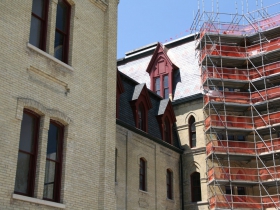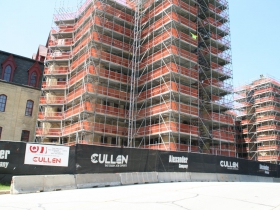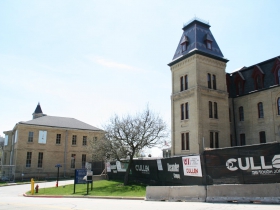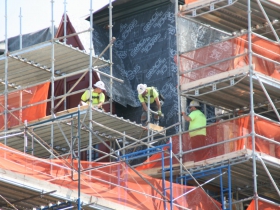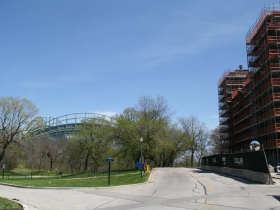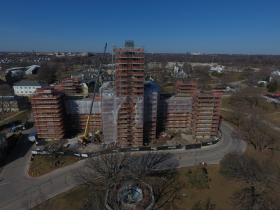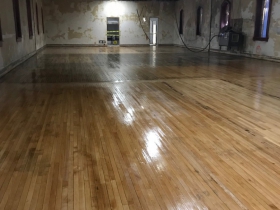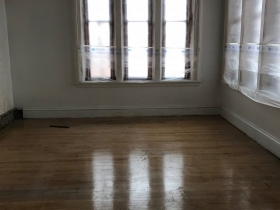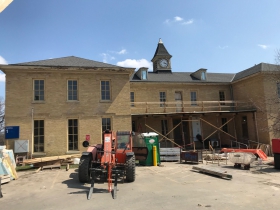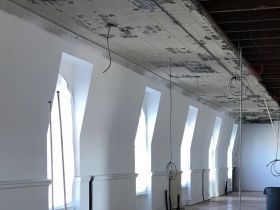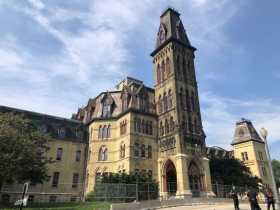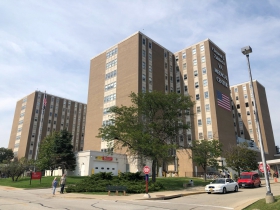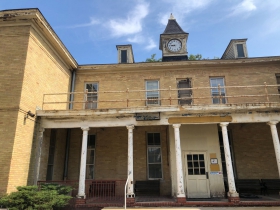A Memorial Day Surprise at Soldiers Home
Tower at Old Main contains 96-year-old etching from World War I veteran.
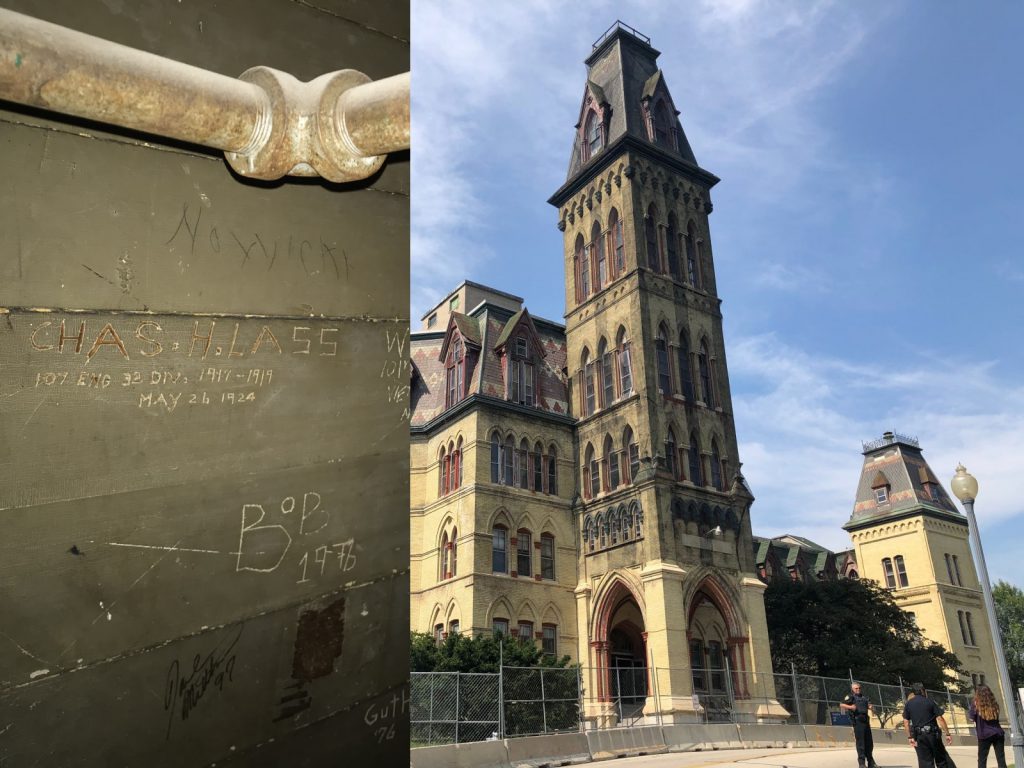
Charles H. Lass etching (photo by JP Cullen), Old Main pre-redevelopment (photo by Jeramey Jannene).
Peter Schumacher, an apprentice with J.P. Cullen, found a long-hidden etching in the tower at Old Main at Soldiers Home while inspecting the building’s historic windows.
Built in 1867 to house returning soldiers after the Civil War, the building has been vacant for decades. The Alexander Company is redeveloping it into a home for veterans at risk for homelessness and has hired J.P. Cullen to lead the general contracting.
Many veterans have already left their mark in the building, the oldest of which drew the eye of Schumacher. “Chas. H. Lass 107 Eng 32 Div, 1917-1919,” reads the engraving. It’s dated May 26, 1924.
Luke Mikula, a site engineer with J.P. Cullen, looked into what Schumacher found, connecting the dots just in time for Memorial Day.
The 32nd Division, Mikula found, is better known as the Red Arrow Division. Red Arrow Park along N. Water St. between E. Kilbourn Ave. and E. State St. is named after the division.
Formed by Army National Guard units from Wisconsin and Michigan, the unit traces its roots back to the Iron Brigade and the Civil War for which the complex was built.
During the time Lass served, his division was the first to penetrate the Hindenburg Line in France, a turning point in World War I. The Milwaukee park reflects the era during Lass served.
A Wisconsin Veterans Museum database lists Charles H. Lass (serial number 257247) as a resident of 840 6th St. in Milwaukee. He achieved the rank of wagoner in the 107th Engineer Battalion.
“As we spend the weekend observing Memorial Day and honoring the men and women who so nobly served our country, we’re reminded that these historic buildings have stories and purpose” said Joe Alexander, president of the Alexander Company. “We think the Red Arrow Division would be proud of the work we’re doing here today.”
For more on the project, see our coverage from last week.
Photos
Photos from Alexander Company
Pre-Redevelopment
The Yards Opens in Walker’s Point
The first residents have moved into The Yards, an, 86-unit apartment building located at the eastern edge of the Reed Street Yards.
The five-story building was constructed on a long-vacant lot at 223 W. Oregon St. along the burgeoning S. 2nd St. corridor in Walker’s Point. The project is the second Milwaukee project for Linden Street Partners. Its first, a 70-unit building dubbed The Quin, is located just to the southeast.
The two buildings, located kiddy corner from one another across S. 2nd St., both feature market-rate apartments, a small commercial space, fitness center and interior deck. The second building, which started with a pitch from landowners General Capital Group and Peter Moede, is slightly larger. RINKA designed both buildings and Altius Building Company led the general contracting. The latter company appears to have a punch list remaining with a handful of facade elements in various stages of completion, including the signature balcony system on the building’s southwest corner.
Read the full article and see the photos
Kovac Pushing Ascension To Improve East Side Parking
No one has a problem with a design change that would add metal panels to a parking garage at Ascension‘s Columbia St. Mary’s Hospital, but the Common Council is holding the change.
The proposal would add panels to the garage at 2318 N. Prospect Ave. to block sunlight that is blinding drivers during winter months.
“I think it could even be an aesthetic improvement,” said City Plan Commission member Allyson Nemec when the proposal was first reviewed on May 11th.
“Within the four corners of the current terrible facade and this metal paneling, this is a mild improvement,” said area Alderman Nik Kovac on May 19th when the Zoning, Neighborhoods & Development Committee reviewed the zoning request.
A 2005 hospital design package allowed three new garages to be constructed. “It was a huge mistake for the city to allow a parking structure this massive and this unadorned to deaden a major commercial corridor,” said Kovac, who was elected in 2008. “One of them looks sort of okay… This one is an abomination. The one on Farwell is an abomination.”
Harbor District Presents Riverwalk Design
The city now has final design standards for a planned extension of the Milwaukee RiverWalk south from the Historic Third Ward to Bay View.
The Harbor District plan will be implemented incrementally, but a number of large projects are already moving forward including Komatsu’s new manufacturing campus and the River One development.
The planned riverwalk would run along the west side of the inner harbor from its conjunction with the existing riverwalk system at the boat launch at E. Bruce St. and then south to Lincoln Ave. When it meets the Kinnickinnic River just north of Barnacle Bud’s restaurant, the riverwalk would be built on both sides of the river.
“What got passed in December 2018 was a placeholder basically,” said Department of City Development (DCD) long-range planning manager Sam Leichtling when the Zoning, Neighborhoods & Development Committee reviewed the plan Tuesday. That plan, covering 42 properties, established an overlay zone to prevent new buildings or structures being built directly atop the future riverwalk corridor.
Compared to the downtown riverwalk, the new riverwalk will allow businesses to continue to use the waterway for their industrial operations, but also encourage more natural amenities.
86 Homeowners Get Property Tax Help
Property values are increasing in the neighborhoods surrounding Downtown. The news would generally be seen as a positive, but city officials have spent the past couple years plotting strategies to avoid displacement for long-time residents.
“There are a lot of people in the community that don’t know all of the efforts we are taking to address this issue,” said Alderman Jose G. Perez at Tuesday’s meeting of the Zoning, Neighborhoods & Development Committee. The Department of City Development crafted an anti-displacement plan in February 2018.
The highest-profile of the strategies is a public-private partnership to provide property tax assistance payments to homeowners experiencing growing assessments and limited incomes. It’s based on an effort in Atlanta.
“We are pretty limited in Milwaukee due to the framework we are operating under,” said DCD long-range planning manager Sam Leichtling. Under state law, the city cannot write checks to itself to pay taxes for its residents. A uniformity clause is included in the state constitution which also prevents capping assessments or providing other special treatment.
But private entities are free to do as they wish. In June 2019, the Greater Milwaukee Committee‘s MKE United initiative, already focused on the areas around Downtown, stepped in to lead the anti-displacement fund. “They were able to work really rapidly to launch this program on a five-year pilot basis,” said Leichtling. The organization raised over $300,000 for the fund in partnership with the Greater Milwaukee Foundation.
City Rezoning Lot for Future North Side Trail
Call it a very small piece of a much bigger puzzle.
The Common Council is poised to rezone the rear portion of a property at 4424 N. Hopkins St. as parkland, allowing it to be merged with a much larger parcel owned by the Milwaukee Metropolitan Sewerage District. The front portion of the irregularly deep lot is occupied by a single-family home.
“It would allow for potentially a trail along this portion of Lincoln Creek,” said Department of City Development planning manager Vanessa Koster when the proposal was before the City Plan Commission.
“Having this piece of property will allow the trail to be constructed out of the flood plain zone,” she said Tuesday when the proposal was before the council’s Zoning, Neighborhoods & Development Committee.
“There is a lot of support from MMSD, DCD and [the Department of Public Works to move this trail forward,” said DCD senior planner Amy Oeth. “We are actively talking and meeting on it.”
Downtown TIF Will Bail Out Three Districts
The Department of City Development is proposing to use excess property tax revenue from a downtown tax incremental financing (TIF) district to bail out three underperforming districts across the city.
The TIF district created to fund the redevelopment of the properties attached to the Grand Avenue Mall starting in 1998 (#37) is generating approximately $2.2 million in excess property tax revenue now that the $31.5 million in project costs associated with it have been paid off. “We are really at that point where the [TIF district] is ready to close and payoff,” said DCD economic development specialist Dan Casanova in presenting the plan to the Common Council’s Zoning, Neighborhoods & Development Committee on Tuesday morning.
TIF districts are intended to fund projects that otherwise wouldn’t move forward without the public investment, with the borrowing costs being paid off with incremental property tax revenue collected in the district over a maximum of 27 years. And in the case of the Grand Avenue Mall, despite the mall’s failure, that’s exactly what happened. Property values in the district are up approximately $80 million since 1998. But for at least three other TIF districts, the increased revenue isn’t paying off the debt.
NEWaukee’s The Beacon Gets State Grant
NEWaukee has landed a $250,000 grant from the Wisconsin Economic Development Corporation to support its plan to redevelop the former Schlitz Tivoli Palm Garden in Walker’s Point.
The grant will support the $4.4 million project, which the social architecture firm hopes to complete by 2021.
The City of Milwaukee would act as a pass-through agent for the grant. The Common Council’s Zoning, Neighborhoods & Development Committee approved its acceptance Tuesday morning.
NEWaukee CEO Angela Damiani said the firm, like many others, is facing drastic challenges related to the pandemic. “Upon reflection of that, it even more fortified our resolve,” said Damiani of the organization’s commitment to social connection.
State Creates Pandemic Rent Assistance Program
In the latest distribution of Wisconsin’s share of federal COVID-19 relief aid, low-income Wisconsin renters who have lost income because of the pandemic will get financial help to pay back rent, security deposits, and related assistance.
Gov. Tony Evers announced the $25 million Wisconsin Rental Assistance Program, funded from the state’s allotment under the Coronavirus Aid, Relief, and Economic Security (CARES) Act, on Wednesday.
Aid is available to adult residents with incomes at or below 80% of the median in their county in the month they apply or before. The program provides up to $3,000 in rental payments, security deposits, or both, paid directly to the landlord.
If you think stories like this are important, become a member of Urban Milwaukee and help support real, independent journalism. Plus you get some cool added benefits.
Plats and Parcels
-
New Third Ward Tower Will Be Milwaukee’s Priciest
 Mar 3rd, 2024 by Jeramey Jannene
Mar 3rd, 2024 by Jeramey Jannene
-
New Corporate Headquarters, 130 Jobs For Downtown
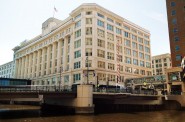 Feb 25th, 2024 by Jeramey Jannene
Feb 25th, 2024 by Jeramey Jannene
-
A Four-Way Preservation Fight Over Wisconsin Avenue
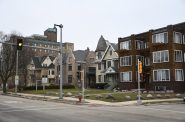 Feb 18th, 2024 by Jeramey Jannene
Feb 18th, 2024 by Jeramey Jannene


